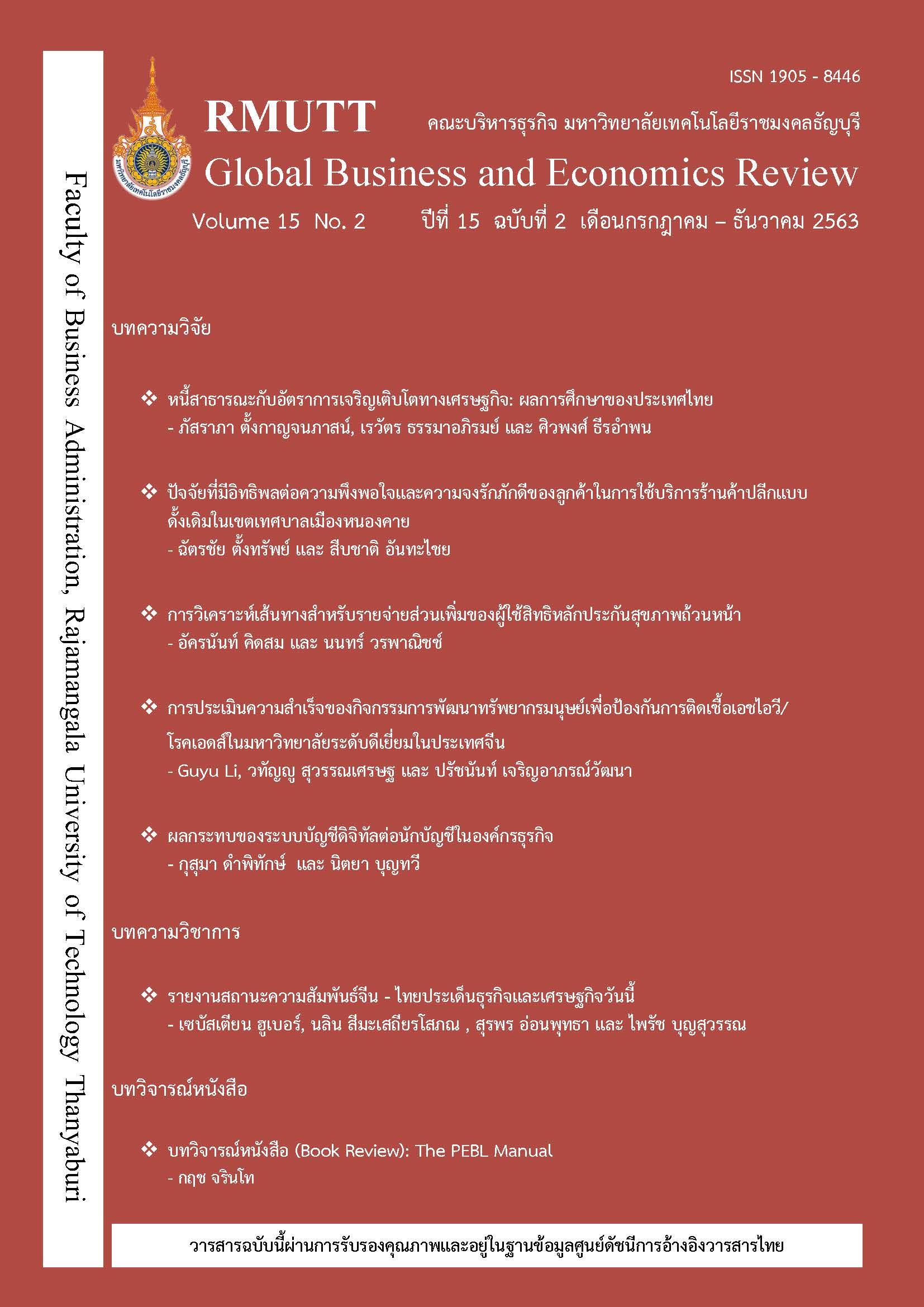STATUS REPORT ON SINO-THAI RELATIONSHIPS IN BUSINESS AND ECONOMICS TODAY
Keywords:
Foreign Direct Investment, Sino-Thai Relationship, Business and Economics MatterAbstract
Sino-Thai relationships emerge from a century-long joint history with waves of Chinese immigrations into Thailand. Today, China constitutes Thailand’s most important trading partner in both import and export while also dominating Thailand’s incoming tourism. Through literature research, expert interviews and insights provided a brief snapshot on several layers of today’s Sino-Thai relationships was complied with an outlook on the need and specific aspects for future research on this topic. After reading, the readers will obtain the overall picture of Sino-Thai relationships as well as analyse and compare strength and weakness in order to consider each countries’ competitive advantages and viewing the guidelines for each countries’ further economic development.
References
Baker, C., & Phongpaichit, P. (2005). A history of Thailand. Cambridge: Cambridge University Press.
Buranatrakul, T. (2019, October). Thailand business environment. Advance business research and theory. Presentation during the 2019 International Study Week by HSLU in Thailand, Silpakorn University, Bangkok.
CAPA. (2018). Thailand low cost airlines: rapid growth as fleet triples in 5 years. Retrieved from https://centreforaviation.com/analysis/reports/thailand-low-cost-airlines-rapid-growth-as-fleet-triples-in-5-years-407712
Cape Dara. (2019). Tourism policy in Pattaya and collaboration between local government and private sector. Advance Business Research and Theory. Presentation during the 2019 International Study Week by HSLU in Thailand, Silpakorn University, Bangkok.
Chansiri, D. (2008). The Chinese Émigrés of Thailand in the twentieth century. New York: Cambria Press.
De Grauwe, P. (1987). International trade and economic growth in the European Monetary System. European Economic Review, 31(1-2), 389-398.
Heng, C. (2019). Company introduction. Seminar in Business Research. Presentation during the 2019 International Study Week by HSLU in Thailand, Silpakorn University, Bangkok.
CNBC. (2016). Thailand is Asia pacific’s most popular tourist destination: mastercard. Retrieved from https://www.cnbc.com/2016/01/27/thailand-is-asia-pacifics-most-popular-tourist-destination-says-mastercard.html
Fosu, A. K. (2013). Achieving development success: Strategies and lessons from the developing world. Oxford University Press.
Jackson, R., Sørensen, G., & Møller, J. (2019). Introduction to international relations: theories and approaches. Oxford University Press.
Klinkasorn, B. (2019). Expert Interview on Sino-Thai relationships in business and economics. Interview recorded on February 28, 2019 in Pattaya, Thailand.
Li, M., Ruangkanjanases, A., & Chen, C. (2014). China’s foreign direct investment in Thailand — current status and future prospects. International Journal of Trade, Economics and Finance, 5(4), 296-304.
Messi (2020). Chinese Economic. Retrieved from http://www.thaifrx.com
Moës, N. (2018). China’s new role in the global economy. Bruegel Organization. Retrieved from http://bruegel.org/2018/05/chinas-new-role-in-the-global-economy/
MOFCOM. (2018). China FTA Network. China-ASEAN FTA. Retrieved from http://fta.mofcom.gov.cn/topic/chinaasean.shtml
Prasertsakul, D. (2019). Companies Strategies preferred in Thailand. Seminar in Business Research. Presentation during the 2019 International Study Week by HSLU in Thailand, Silpakorn University, Bangkok.
Purdey, S. J. (2010). Economic growth, the environment and international relations: the growth paradigm. New York: Routledge.
Sieber, I. (2019). Introduction to Swiss-Thai Relations. Seminar in Business Research. Presentation during the 2019 International Study Week by HSLU in Thailand, Silpakorn University, Bangkok.
Schreier, C. (2019). Eastern VS Western leadership differences developing a transformative leader approach. Seminar in Business Research. Presentation during the 2019 International Study Week by HSLU in Thailand, Silpakorn University, Bangkok.
Song, G., & Yuan, W. J. (2012). China's free trade agreement strategies. The Washington Quarterly, 35(4), 107-119.
Suvakunta, P. (2007). China's go-out strategy: Chinese foreign direct investment in Thailand, Thammasat Review, pp. 116-146. Retrieved from https://sc01.tci-thaijo.org/index.php/tureview/article/view/40851
TradeMap. (2018a). List of importing markets for products exported by Thailand. Retrieved from http://www.trademap.org
TradeMap (2018b). List of supplying markets for a product imported by Thailand. Trade Statistics for International Business Development. Retrieved from http://www.trademap.org
Tourism Authority of Thailand. (2017). Annual Report 2017, Bangkok. Tourism Authority of Thailand Website. Retrieved from https://www.tourismthailand.org/About-Thailand/About-TAT/TAT-Informative
Udomkit, N. (2019). Business Environment in Thailand. Seminar in Business Research. Presentation during the 2019 International Study Week at Mahidol University, Bangkok.
UN Comtrade (2017a). Thailand Exports to China. Trading Economics. Retrieved from https://tradingeconomics.com/thailand/exports/china
UN Comtrade (2017b). China Exports to Thailand. Trading Economics. Retrieved from https://tradingeconomics.com/china/exports/thailand
UNESCAP. (2019). Asia-Pacific Trade Agreement (APTA). United Nations ESCAP. Retrieved from https://www.unescap.org/apta
West, B.A. (2009). Encyclopedia of the Peoples of Asia and Oceania. New York: Facts on File.
Wyatt, D.K. (2004). Thailand: a short history (2nd ed.). Chiang Mai: Silkworm Press.
XINHUA. (2018). Chinese visitors to Thailand hit 10 million for 1st time. Retrieved from http://www.xinhuanet.com/english/2018-12/20/c_137686283.htm
Yahuda, M. (2007). The Sino-European encounter – historical influences on contemporary relations. In China-Europe Relations: Perceptions, Policies and Prospects. Shambaugh, D., Sandschneider, E., Hong, Z. Editor. London: Routledge.
Downloads
Published
How to Cite
Issue
Section
License
The articles published in this journal are the intellectual property of their respective authors.
The views and opinions expressed in each article are solely those of the individual authors and do not reflect the positions of Rajamangala University of Technology Thanyaburi or any of its faculty members. All components and content of each article are the sole responsibility of the respective authors. In the event of any errors, the authors shall bear full responsibility for their own work.








